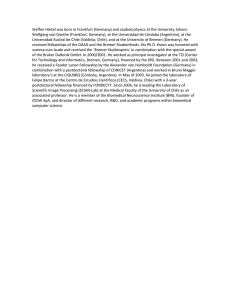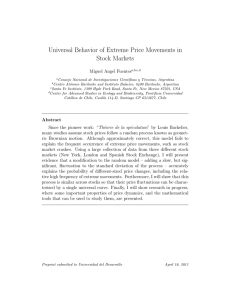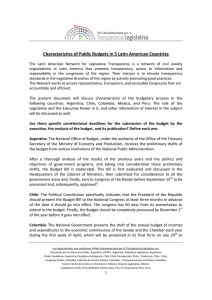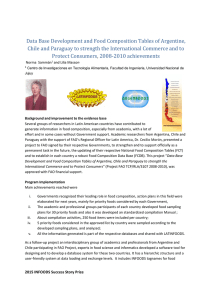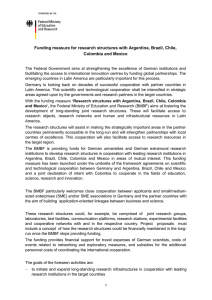Financial Statements and Declarations of Conflicts of Interest in the
Anuncio
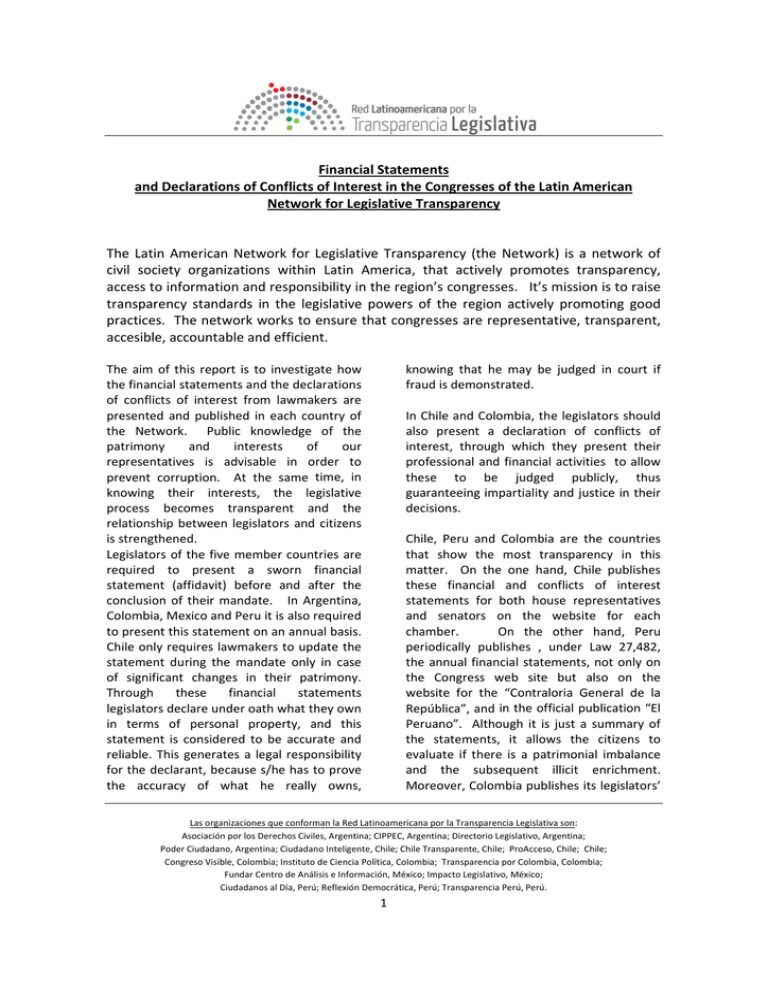
Financial Statements and Declarations of Conflicts of Interest in the Congresses of the Latin American Network for Legislative Transparency The Latin American Network for Legislative Transparency (the Network) is a network of civil society organizations within Latin America, that actively promotes transparency, access to information and responsibility in the region’s congresses. It’s mission is to raise transparency standards in the legislative powers of the region actively promoting good practices. The network works to ensure that congresses are representative, transparent, accesible, accountable and efficient. The aim of this report is to investigate how the financial statements and the declarations of conflicts of interest from lawmakers are presented and published in each country of the Network. Public knowledge of the patrimony and interests of our representatives is advisable in order to prevent corruption. At the same time, in knowing their interests, the legislative process becomes transparent and the relationship between legislators and citizens is strengthened. Legislators of the five member countries are required to present a sworn financial statement (affidavit) before and after the conclusion of their mandate. In Argentina, Colombia, Mexico and Peru it is also required to present this statement on an annual basis. Chile only requires lawmakers to update the statement during the mandate only in case of significant changes in their patrimony. Through these financial statements legislators declare under oath what they own in terms of personal property, and this statement is considered to be accurate and reliable. This generates a legal responsibility for the declarant, because s/he has to prove the accuracy of what he really owns, knowing that he may be judged in court if fraud is demonstrated. In Chile and Colombia, the legislators should also present a declaration of conflicts of interest, through which they present their professional and financial activities to allow these to be judged publicly, thus guaranteeing impartiality and justice in their decisions. Chile, Peru and Colombia are the countries that show the most transparency in this matter. On the one hand, Chile publishes these financial and conflicts of interest statements for both house representatives and senators on the website for each chamber. On the other hand, Peru periodically publishes , under Law 27,482, the annual financial statements, not only on the Congress web site but also on the website for the “Contraloria General de la República”, and in the official publication “El Peruano”. Although it is just a summary of the statements, it allows the citizens to evaluate if there is a patrimonial imbalance and the subsequent illicit enrichment. Moreover, Colombia publishes its legislators’ Las organizaciones que conforman la Red Latinoamericana por la Transparencia Legislativa son: Asociación por los Derechos Civiles, Argentina; CIPPEC, Argentina; Directorio Legislativo, Argentina; Poder Ciudadano, Argentina; Ciudadano Inteligente, Chile; Chile Transparente, Chile; ProAcceso, Chile; Chile; Congreso Visible, Colombia; Instituto de Ciencia Política, Colombia; Transparencia por Colombia, Colombia; Fundar Centro de Análisis e Información, México; Impacto Legislativo, México; Ciudadanos al Día, Perú; Reflexión Democrática, Perú; Transparencia Perú, Perú. 1 financial statements and conflict of interest statements at the beginning of their four year mandate in the Congress Gazette (Gaceta del Congreso) (publications that are also physically available at the Library of Congress and in electronic format on the website of the Senate Secretariat), and also publishes the statements of the Senators throughout their mandate on their website. On the website of the House of Representatives of Argentina there is a list that discloses which Congressmen have presented their financial statements, but there are no actual documents available. In the case of the Argentine Senate, there is no information published in this respect on their website. Although the statements are not available online, citizens may request to have access to this information. In both cases, it is a long and cumbersome process to finally obtain these documents. Lastly, Mexico is the least transparent of the five countries of the Network regarding this matter; despite the fact that Congressmen have the legal obligation to present their financial statements, that there is a Transparency and Public Access to Information Federal Law and that this right is also protected by the National Constitution, the Congress of the Union does not make them available to the citizenship. In Mexico, there is no obligation to make these declarations public and this depends on the personal will of the Congressman or Senator. Nowadays, it is practically impossible for the citizens to have access to these documents. Publication of the Financial Statements Publication of the Interests Statements Lower House Senate Lower House Argentina No Chile Yes No No Yes Yes Yes Yes No Yes No Yes Yes No Senate Colombia Mexico Peru Yes No Yes No However, the obligations before mentioned are not always thoroughly met in some of the countries of the Network. For example, on Argentina’s Lower House web site, we find less than 25% of all the members of the Chamber who presented financial statements. (CHECK) In the same way, Peru also presents some shortcomings. Although the financial statements are published on the website of the “Contraloría General de la República”, those corresponding to the 2009‐ 2010 period are incomplete; and, even until April of this year, only 44% of the legislators had presented their 2010‐2011 financial statement to the “Contraloría”. In the case of Chile and Argentina, they do not have a controlling body that verifies the accuracy of financial statements provided by the legislators. In Chile, a bill has been introduced in Congress at the end of April of Las organizaciones que conforman la Red Latinoamericana por la Transparencia Legislativa son: Asociación por los Derechos Civiles, Argentina; CIPPEC, Argentina; Directorio Legislativo, Argentina; Poder Ciudadano, Argentina; Ciudadano Inteligente, Chile; Chile Transparente, Chile; ProAcceso, Chile; Chile; Congreso Visible, Colombia; Instituto de Ciencia Política, Colombia; Transparencia por Colombia, Colombia; Fundar Centro de Análisis e Información, México; Impacto Legislativo, México; Ciudadanos al Día, Perú; Reflexión Democrática, Perú; Transparencia Perú, Perú. 2 this year, which grants the “Contraloría General de la República” the power to verify the authenticity of the information. In spite of the fact that there is an Ethics and Transparency in Congress Committee in both Lower House and Senate, it is not in charge of verifying the accuracy of the documented information; it only guarantees the citizens access to these documents. In Argentina, according to Law 25,188, there should be a National Public Ethic Committee in charge of dealing with compliance with the presentation of these financial statements and filing them. This Committee has never come into operation, even though the law was sanctioned 12 years ago. Two experiences that undermine legislative transparency: Directorio Legislativo, Argentina. Directorio Legislativo Foundation, from Argentina, requests the financial statement from each national legislator every year. The mechanism to access these statements is far from institutionalized. The process to obtain them every year is extremely cumbersome. In February 2010, the Foundation requested the Administrative Secretariat from the Lower House the financial statements from all the chamber members. After the request was made to the mentioned Secretary, it was sent to the “Direccion de Asuntos Juridicos”, that requested that the Foundation proved that is it a legal entity and presented its founding documents and credentials, among other documents. After a long wait and several formalities, in February 2011 the access to the financial statements was finally possible. Even though the information obtained was complete, the fact that the delivery was delayed one whole year, proves an extreme weakness in the free access to public information. FUNDAR, México. Fundar, from Mexico, requested access to the financial statements presented by the lower house legislators to their chamber. The answer obtained was that the chamber was not qualified to give out that type of information, and that it should be requested to the “Auditoría Superior de Fiscalización”. The information was requested to that controlling body, but the answer referred to an agreement with the House of Las organizaciones que conforman la Red Latinoamericana por la Transparencia Legislativa son: Asociación por los Derechos Civiles, Argentina; CIPPEC, Argentina; Directorio Legislativo, Argentina; Poder Ciudadano, Argentina; Ciudadano Inteligente, Chile; Chile Transparente, Chile; ProAcceso, Chile; Chile; Congreso Visible, Colombia; Instituto de Ciencia Política, Colombia; Transparencia por Colombia, Colombia; Fundar Centro de Análisis e Información, México; Impacto Legislativo, México; Ciudadanos al Día, Perú; Reflexión Democrática, Perú; Transparencia Perú, Perú. 3 Representatives, which established that the financial statements may only by filed, but not published. Therefore, the financial statements were not accessible, despite article 6th of the National Constitution and the Transparency and Access to Public Information Federal Law. After this brief analysis, we observe that transparency and standardize its procedures, there are differences among the Network in order to shorten the delivery deadlines of countries in terms of the will to publish these the information. The absence of an Access documents, which should be publicly to Public Information Law in Argentina does not facilitate the quick and opportune access available in order to guarantee a better to this kind of information. control from the citizenship. Peru, Colombia and Chile are shown as the countries with Public access to information on the the most transparent practices in the matter, Argentina is half‐way and Mexico should patrimony and interests, professional and increase transparency within its Legislative economic, of legislators before, during and Power. Although Mexico has a Transparency after their mandate is essential, in order to Law and the right to access to public control their public activities and prevent information is constitutionally recognized, if corruption cases and conflicts of interest which may be avoided through transparency a citizen wants to access a financial and publication of information. Legislators statement of a legislator, the system’s themselves should promote the opacity makes it impossible: no governmental body provides this information strengthening of their chambers, as well as to the public since they are not competent. insist on promoting the accountability of Moreover, Argentina should strengthen its their institutions through their websites. institutions by trying to increase the system’s Summary of the current legislation in each country of the Latin American Network for Legislative Transparency Argentina Chile Colombia Mexico Peru Law ‐National ‐Congress Organic ‐Law Nº 190 ‐National ‐Political Ethic Law in Constitutional Constitution. Constitucion ‐ Law Nº 443 the Public Law (Nº 18.918) ‐Law 5º (art.40 y 41) ‐Transparency Function ‐ Law 27.482 ‐ State (Congress and Access to exercise. Administration regulation) Information (25.188) General Bases Federal Law. ‐Administrative Organic Las organizaciones que conforman la Red Latinoamericana por la Transparencia Legislativa son: Asociación por los Derechos Civiles, Argentina; CIPPEC, Argentina; Directorio Legislativo, Argentina; Poder Ciudadano, Argentina; Ciudadano Inteligente, Chile; Chile Transparente, Chile; ProAcceso, Chile; Chile; Congreso Visible, Colombia; Instituto de Ciencia Política, Colombia; Transparencia por Colombia, Colombia; Fundar Centro de Análisis e Información, México; Impacto Legislativo, México; Ciudadanos al Día, Perú; Reflexión Democrática, Perú; Transparencia Perú, Perú. 4 Constitutional Law (18.575) ¿Are there No. Only the Yes, it should statements for ones who include detailed conflicts of do no information of interest? access the the professional public and economic function by activities (art. universal 5ºC) suffrage must include in their financial statement the professional and economic antecedents , in order to avoid conflicts of interests. Financial Beginning of Beginning of the Statements the mandate and at presentation mandate end of mandate and at the end of mandate. Annually too, during the whole mandate Control Ethic Public Ethic and Organisms National Parliamentary Committee Transparency (never Committee from created) each chamber (it does not verify the information) Publication No Yes obligatory The legislator should declare himself disabled to participate in votes or debates which affect him in some way, or his married couple, mate or any relative between the fourth consanguinity grade or second affinity, or first civil grade or his company partner/s, since they are in direct interest in the decision. Beginning of the mandate and in its conclusion. Annually too, during the whole mandate Responsibility Federal Law No No Beginning of the mandate and in its conclusion. Annually too, during the whole mandate Beginning of the mandate and in its conclusion. Annually too, during the whole mandate Ethic Committee and Congresal Estatute Public Function Secretary Administrativ e General Direction Yes No Yes Las organizaciones que conforman la Red Latinoamericana por la Transparencia Legislativa son: Asociación por los Derechos Civiles, Argentina; CIPPEC, Argentina; Directorio Legislativo, Argentina; Poder Ciudadano, Argentina; Ciudadano Inteligente, Chile; Chile Transparente, Chile; ProAcceso, Chile; Chile; Congreso Visible, Colombia; Instituto de Ciencia Política, Colombia; Transparencia por Colombia, Colombia; Fundar Centro de Análisis e Información, México; Impacto Legislativo, México; Ciudadanos al Día, Perú; Reflexión Democrática, Perú; Transparencia Perú, Perú. 5 nature Las organizaciones que conforman la Red Latinoamericana por la Transparencia Legislativa son: Asociación por los Derechos Civiles, Argentina; CIPPEC, Argentina; Directorio Legislativo, Argentina; Poder Ciudadano, Argentina; Ciudadano Inteligente, Chile; Chile Transparente, Chile; ProAcceso, Chile; Chile; Congreso Visible, Colombia; Instituto de Ciencia Política, Colombia; Transparencia por Colombia, Colombia; Fundar Centro de Análisis e Información, México; Impacto Legislativo, México; Ciudadanos al Día, Perú; Reflexión Democrática, Perú; Transparencia Perú, Perú. 6
